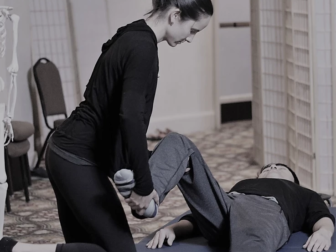Life is not a linear path, as with everything there will always be ups and downs. Marriage, career, family life, raising children, reaching life goals - all take resilience, persistence and a positive outlook. With the complex challenges of today, self care is more important than ever. How can we provide for our children’s complex needs, if we ourselves are running on empty? Our philosophy is about creating awareness for the pillars of health for yourself and family: air, hydration, sleep, nutrition, movement, detox and connection.
AIR:
The number one thing your body needs to survive is air.
Our bodies are biochemical machines. The way you feel, decisions you make, emotions that come up, are all a result of chemical messages in your body. Breathing communicates very specific messages to your body, it is bred into our DNA that shallow chest breathing is our bodies’ response to danger, as evolved when our ancestors lived in the wild.
The bodies’ reaction to stress is to respond in flight, fight or freeze, which means your nervous system responds accordingly, stress hormones (cortisol and adrenaline) are released and you begin to breathe shallow and fast. All energy is diverted away from organs and shunted to limbs for survival. Said another way- in this state, your digestion, immune system and brain are shut down so your body can physically react. Today, most of us stay in this constant state from the daily stress of work, family issues, news etc. So, when we understand this basic principle, we can change the messages being sent to the body, by a very simple technique...BREATHING! Deep breathing (into the belly) communicates a biochemical message of safety to the body, which calms the nervous system, reduces the stress hormones and rediverts energy back to all the internal systems for proper functioning.
Learning breathwork and meditation are a simple but a powerful way to change the state of your body.
The quality of the air we breathe is important too! As we spend much of our time indoors, draw your attention to its quality:
1. Volatile Organic Compounds (VOCs): are gases and odors released from chemicals in our daily lives (paints, cleaning products, carpets, toys, cooking products, furniture, etc.) and can compound with long-term effects like minor irritations, to organ damage.
2. Radon: in certain areas, this gas is released from land development, which can have a significant effect on our lungs.
3. Particulate Matter (PM): range of particles of dust, dirt and liquids in the air that can get into your lungs or blood stream, which can cause a range of minor irritations (runny nose, sore throat), to triggering asthma or allergies, to aggravating cardiovascular and respiratory diseases.
4. Carbon Dioxide (CO2): in large amounts, can affect your sleep, increase drowsiness, headaches, and blood pressure.
5. Pollens: plants in the environment that can be irritants and cause allergic reactions responses.
6. Molds: this is a major problem in the household, when you spot mold bring in a service to assess the area. Breathing in mold spores over time can cause health issues that compound with other conditions.
Tips:
- Breathwork and meditation techniques
- Get out into nature and breathe deeply every day
- Open your windows daily to allow for proper air circulation
- Use fans in the home to keep air circulating
- Use plants in the home to help clean the air
- Consider testing for your home air quality
- Remove chemicals and chemical cleaners from your home
- Use air cleaning filters and products
WATER:
While you can go weeks without food, you need water daily.
Humans constitute about 70% water and our brains are largely made of water. Water is needed to perform every mechanism and system in your body. Most of us are walking around in chronic degrees of dehydration that lead to a variety of unnoticed symptoms - fatigue, joint pains, brain fog, headaches.
Dehydration sends messages of scarcity and distress to our bodies. Our ancestors would have consumed a great deal of their water through the fresh foods they ate since water was not so abundant. As a result, our bodies evolved to send a hunger signal when we are dehydrated in order to prompt us to eat water rich foods. Today, all processed food is severely lacking in water and actually dehydrates us even further.
Tips
- Drink 1-2 glasses of water first thing in the morning upon rising - this rehydrates from the nights detox and wakes up the metabolism/appetite.
- Drink 6-8 glasses of water a day
- Preferably natural spring or filtered water
- Try exploring natural additions like lemons, limes, berries, herbs or essential oils to change up the taste
SLEEP:
In our busy society, unfortunately sleep is slowly being underestimated and undervalued. Sleep is crucial for the body to do all the things it cannot during the day when digestion and focus take priority. During sleep, the body does cellular repairs, elimination of old cells, detox takes place in all organs, including the brain, optimization of the immune system occurs, and it is the only time for muscle and bone growth- highly important for little growing bodies.
Sleep debt is the new growing term used for the chronically sleep deprived. This state becomes the catalyst for dis-ease and premature aging.
Tips:
- Have a moment of sunlight on your face in the morning. This reinforces the circadian rhythm of life and boosts the cortisol naturally as you begin the day. Cortisol spikes at 9am then declines throughout the day, drops sharply at 3pm then dives down after 6pm- this also allows melatonin to begin creation between 6-9pm getting you ready for sleep.
- To the same cycle- keep lights low at night to help melatonin rise and promote proper sleep. Turn florescents off and cut down on screen time- this blue light has the same effect as the sun- keep cortisol going and takes longer to fall asleep. Try softer lamps or blackout curtains for the bedroom.
- Get all electronics out of the bedroom and turn off wifi at night – in addition to the light, they also emit EMFs that disrupt melatonin creation. These are still being studied just how much they disrupt sleep.
- Set a timer for screen cut off one hour before bedtime. The blue light that screens disorientate your body’s natural sleep rhythm. Especially for growing children- it takes the brain a few hours to calm after electronic games.
- Keep the room cool – thermoregulation strongly influences our sleep cycle. We naturally drop our core body temperature to help initiate sleep, but if our rooms are too warm this process is disrupted.
- Calm your anxiety and mental chatter – Deep breathing techniques and mediation can help communicate safety to the body, calm the nervous systems and reduce stress hormones, allowing melatonin to begin to work.
- Watch your caffeine intake – The boost we get from caffeine is actually our metabolism revving up in order to eliminate it from our bodies. Try to avoid stimulants after noon. Caffeine can stay in our systems for up to 24 hours, which means a coffee you drink in the morning will still affect the quality of your sleep at night.
- Magnesium – Magnesium is an anti-stress mineral that our todays’ diets are usually deficient in. Add bananas, pumpkin seeds, coconut kefir, cherries are all high in magnesium and can easily be added to diet. Epsom salt baths are a great way to relax the body and ease into sleep- this is pure magnesium being soaked into the skin. Or consider supplementation if you find sleep is still a struggle.
- Create a sleep routine and re-organize your bedroom into a sleep only sanctuary.
NUTRITION:
Every species on the planet has a specific diet. Humans have evolved to require a diversity of whole foods, which provide nutrients in order to optimally function.
Think about a high-performance sports car that needs a higher-grade gasoline for optimal performance. If you put a low-grade gasoline in that same car, it will still run but you will lose some of the performance capabilities and overtime leads to costly repairs.
Our bodies are the same way, we are meant to extract vital nutrients (vitamins, minerals, amino acids, enzymes, proteins, fats) that keep our body working efficiently. Todays food choices mainly consist of starches, sugars and processed boxes that do not provide what we need. Shelf life has become more important than human health. We need to return to the basics of gardening and eating foods that are living in order to get the nutrients that we need:
- Good fats – Healthy fats are the most crucial for the nervous system, building immunity and cell functioning. They help keep our bodies fluid and hydrated, today we need to be conscious of adding them to meals, since they are removed from most processed foods. Our ancestors living in the wild would have ate seasonally in accordance to the rhythms of nature, and would consume the entire
carcass of animals. Focus on– grass-fed animals, pasture raised eggs, wild fish, nuts, seeds, avocados, olives, nut and olive oils. - Carbohydrates – Our bodies have two fuel systems, a fat burning and a sugar burning system. Our bodies now have evolved to use carbohydrates (simple sugars) as a source of energy. However, these processed foods burn fast and short and leave you crashing and craving for more. Pairing carbs with fats help sustain digestion and energy for the day with no crash. Focus on– whole fruits,
vegetables, nuts, seeds, raw honey. A good example is nut butter with an apple. - Proteins (Amino Acids) – these are the only thing that can create hormones needed for all functions and grow bones and muscles. The amino acids are the building block for proteins in our bodies. Things like all meats, fish, eggs, nuts, seeds, avocados, eggs, hemp- These provide complete proteins in order to ensure we are getting all 9 essential amino acids. If vegetarian, you need to eat large amounts of beans, lentils, nuts and seeds to attain proper protein levels, especially growing children.
MOVEMENT & DETOXIFICATION:
Movement is a core component of our detoxification system. Most of the vital systems in your body are built on a pump system, however, our lymphatic system (detox), moves toxins and waste out of our bodies, does not have a pump.
This system needs movement to mechanically move the fluid that carries the waste and toxins throughout the body. Our ancestors would have been moving constantly to find food, protection, searching for water, or building camp, movement was built into the day. Today our sedentary ways have taken their toll on the physical body, not only in weight, reduced limb mobility but detoxification. Coupled with our growing toxic environment, our bodies are no longer able to eliminate the toxins from everyday life - they compound and cause dis-ease. Keeping a regular practice of movement/activity in your schedule, something you enjoy, is now the only way to keep these systems moving as we age.
Core Movements to consider:
- Flexibility – As people age, they become more rigid in their bodies, so there needs to be conscious effort given towards creating more flexibility (physically, emotionally and mentally)
- Cardio – These days we barely move in comparison to our ancestral history. Cardiovascular health is one of the leading indicators for longevity and quality of life.
- Strength – As people age, muscles begin to atrophy, so it is important to ensure good muscle density throughout your life. Your muscle density is also correlated to your metabolic health, which is key for immune health, weight management and energy efficiency.
Connection: We are social animals and best we survive by living in a community setting. Physical touch and the act of connecting and giving with another human causes the release of oxytocin and serotonin hormones, which boosts our mood, supports immune function, and reduces stress. Taking the time with your loved ones, therapy, massage, neuromovement, osteopathy, there are many ways you can remain connected and grounded with others.





